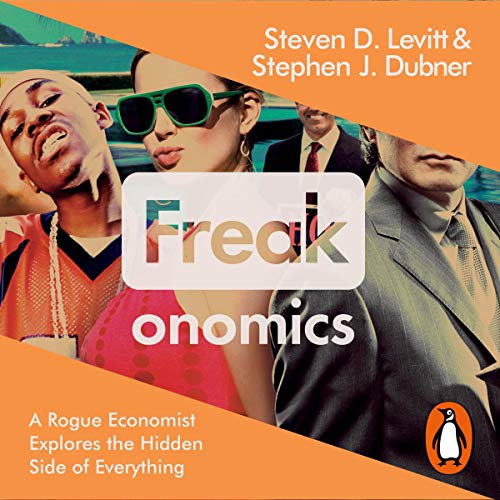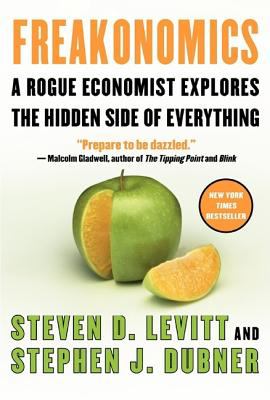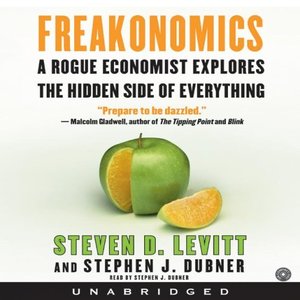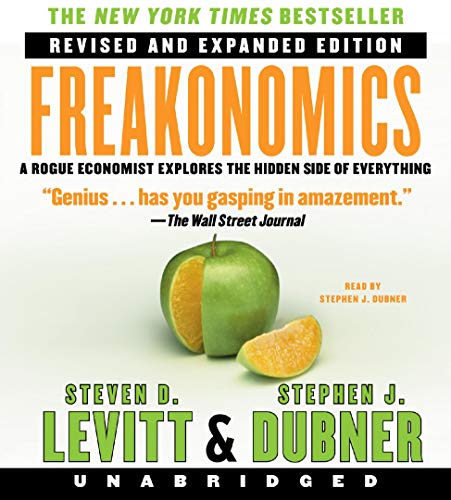Steven D. Levitt’s “Freakonomics” audiobook explores hidden economic forces behind everyday life. It combines economic theory with real-world phenomena.
Steven D. Levitt, a renowned economist, co-authored “Freakonomics” with journalist Stephen J. Dubner. The book delves into unconventional questions, revealing unexpected truths about human behavior and societal norms. Levitt uses economic principles to analyze diverse topics like crime rates, education, and parenting.
The audiobook format makes these complex ideas accessible and engaging. Listeners gain insights into how incentives shape actions and decisions. Levitt’s approach challenges conventional wisdom, urging readers to look beyond surface-level explanations. “Freakonomics” stands out for its compelling storytelling and thought-provoking analysis, making it a must-listen for anyone curious about the hidden side of everything.

The Genesis Of Freakonomics
Have you ever wondered how strange economic theories can explain everyday mysteries? Freakonomics, the audiobook by Steven D. Levitt and Stephen J. Dubner, delves into this. It uncovers hidden truths behind odd societal trends. But where did this idea come from? Let’s explore the origins of this groundbreaking work.
Steven D. Levitt’s Background
Steven D. Levitt is a renowned economist. He has a knack for solving unusual problems. Born in 1967, Levitt grew up in Minnesota. He earned his Ph.D. in Economics from MIT. Levitt’s unique approach to economics sets him apart.
His research often focuses on unconventional topics. These include crime, corruption, and education. Levitt believes that data holds the key to understanding human behavior. His work has earned him numerous awards. These include the prestigious John Bates Clark Medal.
Collaboration With Stephen J. Dubner
Stephen J. Dubner is a journalist and author. Dubner met Levitt while writing for The New York Times. Their first meeting sparked an exciting partnership. Dubner found Levitt’s work fascinating. He decided to write a profile on him. This article laid the groundwork for Freakonomics.
Dubner and Levitt soon realized they had a shared vision. They wanted to explore the hidden side of everything. Together, they combined their skills. Levitt provided the data and theories. Dubner crafted the stories. Their collaboration led to a unique and engaging audiobook.
Their partnership transformed complex economic ideas into captivating narratives. This made Freakonomics accessible to everyone.
Core Concepts And Revelations
The audiobook ‘Freakonomics’ by Steven D. Levitt unravels fascinating insights. It delves into the hidden side of everything. The core concepts and revelations presented are eye-opening. They challenge everyday assumptions and reveal surprising truths.
Incentives As The Cornerstone
Incentives drive human behavior in unexpected ways. Levitt explains how incentives shape our actions. He uses compelling examples to illustrate this point. For instance, teachers may cheat to improve test scores. Why? Because their job security depends on it. Parents might lie about their address to get kids into better schools. Why? Because they want the best for their children.
Levitt categorizes incentives into three types:
- Economic incentives
- Social incentives
- Moral incentives
Each type of incentive influences decisions differently. Understanding these can help predict behavior more accurately.
Conventional Wisdom Challenged
Levitt challenges the notion of conventional wisdom. He argues that it often relies on assumptions rather than facts. For example, he questions the true impact of good parenting on children’s success. He provides data showing that some accepted beliefs might be wrong.
Some key points where conventional wisdom is challenged include:
- Crime rates and their relation to abortion laws
- The real estate market dynamics
- Drug dealers’ earnings and their living conditions
Levitt’s revelations prompt us to rethink what we believe to be true. Data analysis and empirical evidence are crucial in uncovering the truth.
Impact And Criticisms Of Freakonomics
Steven D. Levitt’s Freakonomics audiobook has had a substantial impact. It has sparked both widespread interest and serious critiques. This section delves into its influence and the debates it has generated.
Influence On Popular Economics
The audiobook has made economics accessible to many. It explains complex concepts in simple terms. This has led to a surge in interest in economics.
Freakonomics uses storytelling and examples. This approach has drawn in listeners who might avoid traditional economics books.
Many people now see economics as a tool for understanding everyday issues. This shift has broadened the audience for economic studies.
| Aspect | Impact |
|---|---|
| Audience | Broadened |
| Interest in Economics | Increased |
| Approach | Storytelling |
Points Of Contention
Not all responses to Freakonomics have been positive. Some critics argue the book oversimplifies complex issues. They believe this can lead to misunderstandings.
Others feel the book’s approach is too casual. They worry this might undermine the seriousness of economic study.
A few experts disagree with some of Levitt’s conclusions. They argue that his methods or data are flawed.
- Oversimplification of issues
- Casual approach
- Disagreements on methods
Despite these criticisms, the audiobook has left a lasting mark. It has reshaped how many view economics.


Conclusion
Steven D. Levitt’s “Freakonomics” audiobook offers fresh insights into everyday economics. It’s perfect for curious minds. Delve into surprising connections and fascinating data. This audiobook is a must-listen for anyone eager to see the world differently. Enhance your knowledge with Levitt’s engaging storytelling.
Don’t miss out on this enlightening experience.



